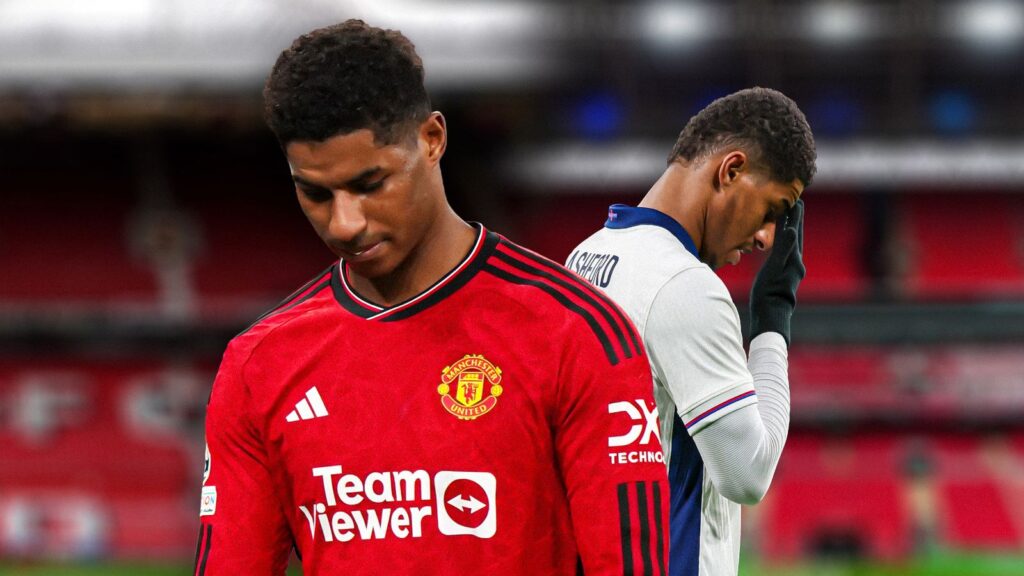It was a measure of just how good Marcus Rashford had been at the tournament that, in the aftermath of England’s World Cup quarter-final loss to France in 2022, one of the biggest frustrations felt by fans was that he did not appear sooner from the bench.
Rashford had hit three goals in just 137 minutes of action in Qatar, his first coming 49 seconds after his introduction in England’s opener against Iran; his next two, including a stunning free-kick, inspiring the 3-0 win over Wales that sent them into the last-16.
Against France, though, Gareth Southgate waited until the 85th minute to send on his most in-form attacker, the change ultimately coming too late as England lost 2-1. Harry Kane’s missed penalty was the biggest ‘if only’ but the delay over Rashford was another.
His call-up to the tournament, after a period in the international wilderness, came in the middle of a dazzling season for Manchester United in which he struck 30 goals in all competitions, winning their Player of the Year award and earning a new five-year deal.
How quickly things have changed. Less than a year on, Rashford, seemingly facing an uncertain future at Manchester United, is on the outside again, with Southgate finding no room for him even in his extended provisional squad for Euro 2024 that could include over 30 players.
A player who lit up England’s last major tournament appearance only a year and a half ago, ostensibly in his prime at 26 years old, will play no part in this one at all.
The most damning thing is that it does not come as too much of a surprise. Rashford is not the only Manchester United player to have suffered a loss of form this season. But his has been especially stark given the heights he was scaling previously.
In total, there have been only eight goals and five assists in 42 appearances, his Premier League productivity dropping to its lowest point since the 2016/17 campaign. And that is saying something given the extent of his struggles in 2021/22.
Of course, it is not easy to shine in such a dysfunctional United team. Rashford has clearly lacked the thrust and confidence of last season. But there is an argument that, to some extent, his struggles are symptomatic of the circumstances surrounding the side.
Rashford was so prolific last season partly because he played nearly as many minutes up front as he did on the left. With Rasmus Hojlund added in the summer, the ratio has changed.
Rashford’s shot maps show he is getting far fewer opportunities, particularly in the most dangerous positions. Consider the fact he has only had one effort in the six-yard box, down from 11 last season. His overall numbers for shots per 90 minutes are down by a third.
It is more difficult to find mitigating circumstances, though, when it comes to his off-the-ball work. Rashford’s work rate came under scrutiny after a clip of some half-hearted pressing against Luton in February went viral and the numbers show a drop-off generally.
According to Opta, Rashford is making fewer pressures and fewer pressures in the final third. Tracking data shows he is covering slightly more ground but averaging fewer sprints than in any of the previous three seasons. His intensity has plainly dropped.
“I don’t know how to say this but there’s something not right,” said Sky Sports pundit Gary Neville in April. “He’s not right. And it’s not just a case of he’s not playing football well, he doesn’t look happy.”
His relationship with some sections of the Manchester United fanbase has become increasingly strained.
His last start, in last month’s shootout win over Coventry in the FA Cup semi-final, ended with him being booed off by some supporters when he was substituted with an apparent injury following the latest in a long line of ineffectual displays.
When he eventually returned to the Manchester United squad, as a substitute for the recent win over Newcastle, he was involved in a heated argument with a fan while warming up.
His on-field struggles have come to a backdrop of disciplinary issues, including an unsanctioned trip to Belfast in February, after which he reported ill to training, and a trip to a nightclub after defeat to Manchester City in October, for which he had to apologise.
Rashford sought to defend himself afterwards, admitting he had made mistakes in an article on The Players’ Tribune, but rejecting accusations over a lack of commitment to Manchester United and questioning his treatment by some sections of the media.
Certainly, Rashford is more closely scrutinised than most players. There can be no justification whatsoever for some of the abuse meted out to him, particularly on social media, dating back to his penalty miss in the final of Euro 2020 against Italy.
A period out of the international side followed that tournament, but Southgate stuck by him in the wake of the World Cup, even in the context of poor performances in the first half of this season, naming him in his squads in September, October, November and then, most recently, for England’s friendlies against Brazil and Belgium in March.
Looking back, though, it was probably telling that his only minutes in those games came in the form of a 15-minute cameo against Brazil.
Southgate has now added Anthony Gordon to his options on the left. He has to find a way to include Manchester City’s Phil Foden in his starting line-up. Jack Grealish is still valued and there is an emergent Cole Palmer to consider too.
All of which has left Rashford by the wayside. His electrifying talent was clearer than ever during England’s last major tournament appearance. But it will not feature at all at this one. In truth, it has not been apparent all season.








